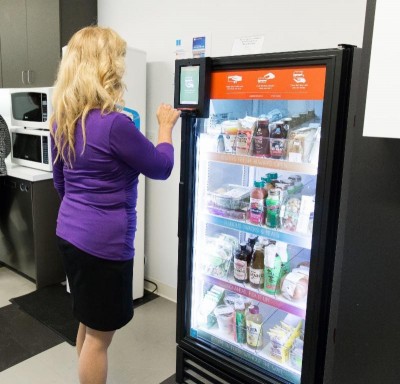Byte Foods Uses Technology To Maximize Local, Fresh Variety Tailored To Individual Locations
Silicon Valley employees can say goodbye to static delivery routes and standardized menus.
 The hotbed of technology innovation has given birth to an Internet of Things (IoT) fresh food startup that allows employees to preview what’s available in the break room from their mobile device and authorize payment just by picking an item from the machine.
The hotbed of technology innovation has given birth to an Internet of Things (IoT) fresh food startup that allows employees to preview what’s available in the break room from their mobile device and authorize payment just by picking an item from the machine.
Byte Foods, a San Rafael, Calif.-based startup with around 45 employees, utilizes proprietary software, a touchscreen and an Internet-connected, glassfront refrigerator to make it easy for employees to have fresh meals, snacks and drinks every day. The demand planning software ensures the refrigerator is always stocked with menu items tailored specifically to the individual employees.
“This allows the business to have high quality fresh meals in the office 24/7 that’s catered for their specific employees,” said Lee Mokri, co-founder and vice president of sales and marketing. “Now you can’t tell the difference between what’s in the restaurant down the street and what’s in the office.”
“If you provide food on site, people eat at their desks and are often more productive,” he said. “This allows them to provide really high quality food at a fraction of the cost (compared to 100 percent subsidized food or the cost of the employee leaving the office).”
A customer survey found that 90 percent of the employees believe the service allows them to make healthier eating choices at work.
Locations pay a flat fee to offer the service to their employees. Byte Foods’ clients include Tesla, Amazon, Cisco, Gilead, Chevron, Virgin America, CBS, Comcast and hundreds more. The average location has around 200 employees.
Locations can subsidize a portion of their employee purchases. Some choose to subsidize 100 percent. Some subsidize based on time of day to support those employees who work late or arrive early.
How It Works
The glassfront merchandiser has an electronic screen at the top left displaying the menu, ingredients and the price for each item. Customers open the machine door by swiping their credit, debit or prepaid card.
Each item in the machine has an RFID tag embedded in its packaging that automatically charges the card once the customer removes the item from the refrigerator. Sensors automatically scan the inventory when the door closes and activate the charge for the purchase.
The machine has an inventory management system that allows Byte Foods to monitor the machines’ inventories remotely in real time.
Menus Tailored To Locations
The menus are not standardized; meals are tailored to individual locations based on customer demand and feedback. Byte Foods’ demand planning algorithms closely watch what is being purchased and make recommendations based on individual purchase behavior. The company actively solicits customer feedback on its website.
“Out of the hundreds of refrigerators we have in the Bay area now, there are no two that are the same,” he said.
The “open slotting” interior of the machine allows the patron to view all the products available simultaneously, as opposed to only being able to see the first product in a column, as in a traditional glassfront vending machine. Hence, the Byte Foods machine’s menu is not restricted to the number of facings, allowing for much greater variety than a traditional vender.
Flush with a recent $5.5 million investment, Byte Foods now plans to continue innovating on the hardware and expand beyond the Silicon Valley to other markets.
In Search Of Fresh Food
Mokri and his wife, Megan, operated a meal delivery service called 180 Eats before stumbling across Pantry Retail Inc., which built the smart, refrigerated merchandiser. They began placing and operating some Pantry Retail units, using food sourced from local providers.
“We quickly realized that the unit economics (for the B2B market) made a lot more sense (than delivering food to individual consumers),” said Mokri. The first step was to license Pantry Retail’s technology. After becoming Pantry Retail’s largest client, the Mokris acquired Pantry Retail and its patented technology in May of 2016.
Byte Foods stocks customers’ machines with products from hundreds of local brands that employees are familiar with. They receive deliveries 24/7 at their warehouse from hundreds of local purveyors. “That’s kind of a draw for our customer base,” Mokri said. “They recognize a lot of the brands from the local Whole Foods they may shop at.”
Most of the products have 2- to 4-day shelf lives. “We’re able to do that because of the technology that we use,” Mokri said. “We can see in real time what’s in any of our refrigerators throughout the Bay area. We know when things were delivered, and when they’re going to expire. That allows us to serve fresh food.”
“We’re using demand planning algorithms that we’ve developed that allow the computer to make that (service) decision,” Mokri said.
The warehouse employees stock the machines guided by a monitor that displays each individual machine’s inventory. “They put them in the bin, and trucks come and pick up the food 24/7,” Mokri said. “We can deliver food at 2 a.m., and the food is ready to go when employees start arriving at 7 a.m.”
“What’s stocked is entirely controlled by these demand planning algorithms,” he said.
The average location gets four to five deliveries per week. At minimum, locations are serviced three times per week. Some are serviced three times a day.
“Depending on the tastes of the individuals at the business, we will curate the contents of the refrigerator appropriately,” he said. For instance, salads range from $4 to $10. Juice can range from $2.50 to $10. “It’s all over the board, which allows our clients to give us an idea of where their employees stand in the spectrum we offer.”
Customer input sought
Following each purchase, customers are automatically sent an itemized receipt via email asking them to rate the food based on taste, freshness, price and convenience. Any poorly rated response prompts a call from the company to see how it can improve the service. In some cases, the company can even offer refunds in real time. “If you rated anything a one star, you’ll often get a refund,” Mokri said.
The receipts contain links where employees can view the machine’s inventory in real time. “You don’t have to walk down the hall,” Mokri said.
Customers are invited to use email to request items.
Dynamic Pricing
The software allows for dynamic pricing. Byte Foods, or the business they’re working with, can subsidize the cost of the food or offer one-time discounts or “happy hours.” That means everything in the refrigerator can be discounted to drive volume in instances where there is excess inventory.
For products that do come back, Byte Foods donates the food to charity.
Byte Foods often provides its food suppliers the RFID tags that go on the packages. Most of the suppliers attach the RFID tags prior to delivery. “They add the tags when they are packaging the products,” Mokri said.
Licensing The Technology
The company has already licensed the technology to food and refreshment service operators throughout the country. Operators can purchase the machines and pay a subscription fee for the software. In some cases, the operators lease rather than buy the machines.
“They can license the technology, and then service the machines with the food that they source,” Mokri noted. Using Bytes Foods technology, the licensing operator has access to metrics such as price by machine and price by day. “It’s a really rich dashboard with a ton of information,” Mokri said. “It allows them to decide exactly what needs to be stocked.”
Mokri expects the company will focus more on the service side of the business than the licensing side since they retain control of the quality of service.
The recent capital investment will allow the company to explore expanding into new geographic markets, as well as find ways to continue reducing the cost of the technology.
By reducing the cost, Mokri said the technology will allow operators to meet the challenge of providing fresh food in remote locations. “In the past, fresh food had to be in one central location, with a cashier. Now businesses can begin thinking differently because without the need for a cashier you can extend the reach of fresh food to other buildings on a campus or on each floor in a building,” he said.
With its proprietary technology, Bytes Foods is both a refreshment services provider and a technology company.
For more information: http://www.bytefoods.co/, Phone: 415-747-1991, hello@bytefoods.com
By Elliot Maras
![]() Vending Technology News | More News | Vending Newsletter sign up | Questions? Contact us | email press release |
Vending Technology News | More News | Vending Newsletter sign up | Questions? Contact us | email press release |
Also see: Software Companies | Technology Companies | Micro Markets | Cashless Vending | Distributors | Classified Ads | Home |
VENDING YELLOW PAGES DIRECTORIES:
Call us at 1-800-956-8363 to POST YOUR COMPANY, or QUESTIONS?




